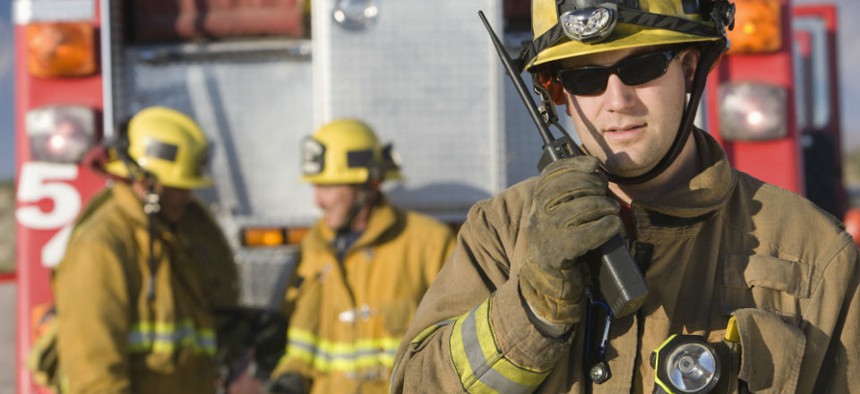
bikeriderlondon / Shutterstock.com
The Government Just Found the Funds to Give Firefighters High-Speed Internet Everywhere
The nationwide data network recommended by the 9/11 Commission will help responders talk to each other.
The federal government has raised more than enough money to build a nationwide communications network for first responders.
The network will help police, firefighters, and other public-safety officials from different agencies communicate with each other during emergencies. It is intended to handle high-speed data, so officials should be able to send photos and videos to each other, helping them coordinate their responses.
The Federal Communications Commission said Tuesday that it has raised at least $10 billion from auctioning the rights to a band of wireless frequencies to cellular carriers. That number is expected to rise as the auction continues.
The high-speed communications network, called FirstNet, is estimated to cost $7 billion. Any auction revenue not used for the network will go toward paying down the federal debt.
The network was a key recommendation of the 9/11 Commission Report. During the 2001 terrorist attacks, many responders from different jurisdictions were using incompatible radios and were unable to talk to each other. Firefighters rushed into the World Trade Center not knowing that the towers were about to collapse.
It took years for Congress to address the problem. Finally, in 2012, Congress passed a law to set aside a block of frequencies for public-safety officials. But Congress told the FCC to raise the money to build the nationwide network of cell towers that will handle the data.
The agency raised about $1.5 billion from auctioning off one block of airwaves earlier this year. With the $10 billion from the latest auction, the FCC has easily surpassed the estimated cost of FirstNet.
Verizon, AT&T, T-Mobile, and Dish Network all registered to bid in the latest auction, but the FCC will announce the winners only once the auction is over. The companies are willing to spend so much because the additional airwaves will help them handle more data, meaning better video streaming for their customers and fewer dropped calls.
Securing enough money for FirstNet takes some pressure off the FCC as it prepares for a much more complicated airwave auction in 2016. The FCC plans to pay broadcast TV stations to go off the air, and then sell their licenses to the cellular carriers. The revenue from this week's auction is also a positive sign that the cellular carriers will spend big for the TV airwaves.
It will still be several years before any first responder is able to take advantage of FirstNet. An advisory board made up of federal, state, and local officials is still overseeing the planning of the network.
(Image via bikeriderlondon / Shutterstock.com)







